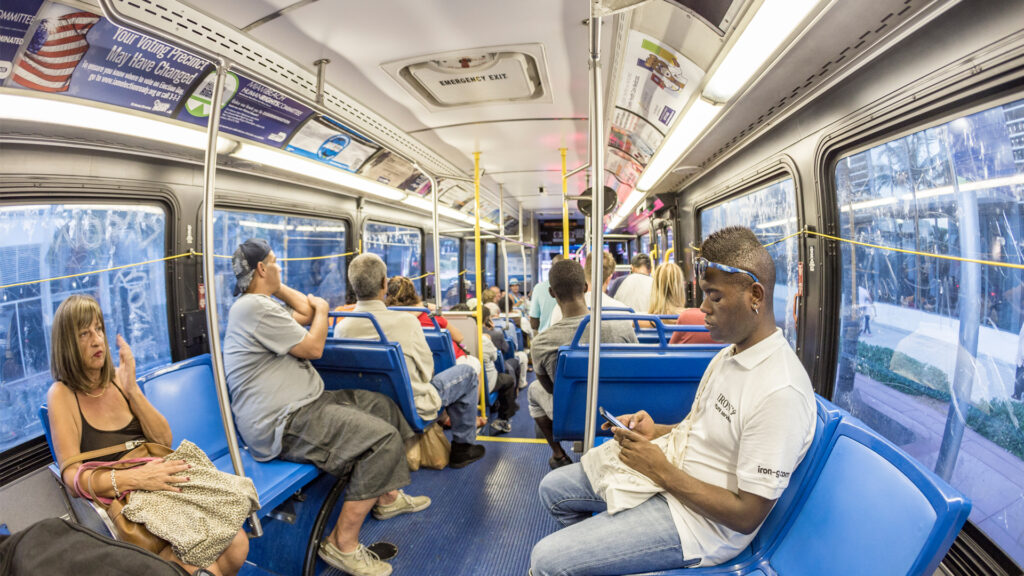By LeeAnn Hall, National Campaign For Transit Justice
In June, we witnessed the earliest ever Category 5 hurricane to form in the Atlantic Ocean. The storm caused more than 1 million people to lose power for more than four days and caused deaths as far away as Vermont.
In just the first 10 days in July, more than 28 people died from a record heat wave. And globally, July 22 marked the hottest day ever recorded.
The climate crisis isn’t coming — it’s here now. We see it all around us — in cities and rural areas, and on the coasts and in every state in between. It impacts everything, from our economy to our national security.
Each passing year brings unprecedented heat waves, wildfires and extreme weather events that wreak havoc on our communities in more ways than one. Rising temperatures strain energy resources, escalate health care costs due to heat-related illnesses and displace vulnerable populations from their homes.

The climate crisis demands swift and decisive action — like bolstering public transportation.
The dirty secret is that the transportation sector is the largest source of U.S. climate pollution — and 80% of transportation emissions come from the cars and trucks on our roads. It’s one of the only major sectors where emissions are still rising.
Because of this, investing in public transit is one of the most sensible and impactful things we can do to address the climate crisis on the scale that’s needed.
First and foremost, public transit offers a direct solution to reducing greenhouse gas emissions. Unlike personal vehicles, which contribute significantly to carbon dioxide and other pollutants, public transit systems can transport large numbers of people efficiently and with reduced environmental impact per capita. Robust public transit networks decrease our reliance on fossil fuels, curbing emissions that drive climate change.
Moreover, investing in public transit promotes sustainable development. By prioritizing accessible, reliable transit options, cities can mitigate urban sprawl and reduce the need for expansive road networks and parking infrastructure.
Public transit also promotes more equitable access to opportunities.
In much of the country, transportation remains a barrier that limits access to jobs, education and health care, particularly for marginalized communities. By expanding and improving public transit services, policymakers can enhance mobility options for all residents, promoting economic inclusivity and reducing disparities exacerbated by car-centric planning.
Investing in public transit also bolsters resilience against the impacts of climate change. As extreme weather events become more frequent, public transit can serve as a critical lifeline, ensuring that communities remain connected and functional during emergencies. From evacuations to disaster response efforts, a robust transit system enhances a city’s ability to respond swiftly and effectively to crises.

Despite this, for far too long, policymakers in Washington have prioritized highways and cars over public transit.
Luckily, there’s new legislation in Congress to fix this. Bills have been introduced in both the House and the Senate to provide more money to states and municipalities to increase their transit options. Congress should pass these bills without delay.
The climate crisis necessitates bold and proactive measures. Investing in public transit isn’t merely an option — it’s a moral imperative and a practical solution to combat climate change while fostering equitable and sustainable urban development. By prioritizing public transit, policymakers can chart a course towards a more resilient, inclusive and environmentally sustainable future for all.
The time to act is now. As this summer has shown, we don’t have a moment to spare.
LeeAnn Hall directs Just Strategy’s National Campaign For Transit Justice. This op-ed was distributed by OtherWords.org.
If you are interested in submitting an opinion piece to The Invading Sea, email Editor Nathan Crabbe at nc*****@*au.edu. Sign up for The Invading Sea newsletter by visiting here.



